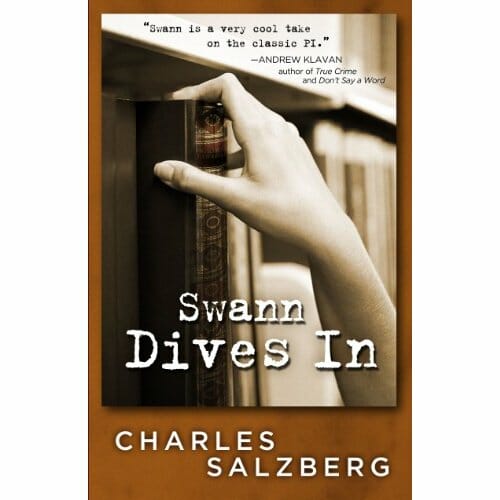Swann Dives In by Charles Salzberg
A man of literature uncovers a crime ...

British writer Stuart Evers addressed the question of mystery fiction as literature, observing that, “…at its best, crime writing offers unique insights into society, psychology, and human behavior. It can be both engaging and literate; compelling and well-written. It can be innovative and surprising, but what it can’t be, it seems, is feted in the same way as literary fiction. The most crime writers can hope for is to be told, as Ian Rankin indeed was, that their novels ‘almost transcend the genre.’ Faint praise indeed.”
Swann Dives In, Charles Salzberg’s second fiction of a series, gives the subject a new wrinkle. This book’s characters integrally involve themselves in branches of literature. One, like the author himself, makes a living as a lit professor. A second, the villain, churns out a fortune in high-value first- and second-edition books. The entire tale swarms with collectors, traders, a librarian, a seller, auctioneers, etc. You don’t find much (on these pages, that is) not book-related. So the Proustian reference in the name of Salzberg’s hero is no accident.
The central character in the tale would have you think he’s just a casual book reader like most of us. Academically, he’s a drop-out from Columbia who works as a skip tracer for a bail bondsman in Syracuse. If you think the occupation requires less skill at tracking down a fugitive than the skills of a Michael Connelly gumshoe, you haven’t discovered Henry Swann.
As in almost every noirish mystery with a male sleuth at center stage, we find a broad … but here she’s not the client. Instead her father, rich alpha-male Carlton Philips, comes to Swann. The counsel, like any self-made millionaire with pride and arrogance to burn, expects miracles. He wants Henry to find his estranged daughter Marcy in a day or two. She’s living with a scoundrel of low morals, one Sean Loomis. Philips’ dear runaway hasn’t returned phone calls in all the months since she disappeared from her apartment with her miscreant lover boy. Philips isn’t so much wounded as deeply worried … or so he would have his skip tracer believe.
Swann doesn’t much care for the man’s overlord demeanor. He also senses that there’s more to the case than Philips lets on—a suspicion that will thicken with the plot, starting when he learns that Marcy isn’t even the daughter’s real name. Still, a sleuth doesn’t have to like, or even trust, an employer if the guy pays in big figures and can keep from becoming a pest… or his own worst enemy.
Operating under the belief that finding Loomis will lead to the girl, our self-deprecating, methodical hero treads the same avenues a brilliant rogue might take on a path to the rare book trade (where BTW, his client lawyer is a big-timer). Swann interviews people who have known Loomis from the time he was an errant but special student, and a picture emerges of a very accomplished scoundrel: astute, IQ near the intellectual heavens, a lawyer, a criminal mastermind. This image firms with each professor, librarian, collector, book trade professional and con artist willing to tell what he or she knows.
With books and literature discussed almost every page, you might take Swann to be a dour academic. While he can appreciate the value of a rare first-edition of a classic, Swann proves human: down-to-earth, personally flawed, an ex-alcoholic with a broken marriage. He gives himself to philosophizing over the ironies of life, his sardonic wit ever on display. In a hotel bar meeting, Professor Richard Dubin, who knew rascally Sean as a lit major some years before, observes to Swann, “Frankly, if you ask me, you look a little lost.” Swann knows better than to deny it, saying, “Like Daniel Boone once said, ‘I can’t say I was ever lost, but I was bewildered once for three days.’”
Swann’s a guy you wouldn’t mind having a beer with. A guy you can become very concerned about when he steps into the zone of violent, desperate men and personal danger.
-

-

-

-

-

-

-

-

-

-

-

-

-

-

-

-

-

-

-

-

-

-

-

-

-

-

-

-

-

-

-

-

-

-

-

-

-

-

-

-








































